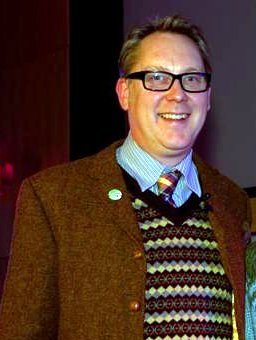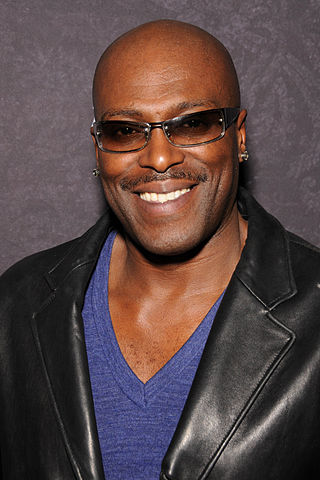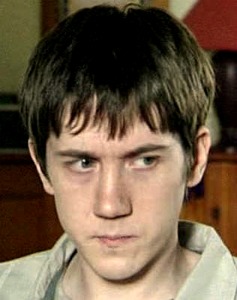This article has multiple issues. Please help improve it or discuss these issues on the talk page . (Learn how and when to remove these template messages)
|

Steve Day is a British deaf stand-up comedian.
This article has multiple issues. Please help improve it or discuss these issues on the talk page . (Learn how and when to remove these template messages)
|

Steve Day is a British deaf stand-up comedian.
Day was a finalist in the Daily Telegraph Open Mic Award in 2000, and a finalist in the Hackney Empire New Act of the Year in 2002.
Day has had several one-man shows at the Edinburgh Festival Fringe: "Deaf in the Afternoon" (2002), "A Night at the Pictures" (2005), "Comprehensive Steve Day" (2006), "A Night at the Pictures (2007), Should I Stay or Should I Go? (2008)", and "Run, deaf Boy, Run" (2011).
In 2005, Day performed as part of "Abnormally Funny People", with Steve Best, Liz Carr, Tanyalee Davis, Chris McCausland and Simon Minty. He still makes occasional performances as part of the group, most recently a promotional video for the Disability Rights Commission. He tours extensively around the UK.
Day has appeared on and written for several BBC Radio 4 shows.
Day lives in Sutton Coldfield, West Midlands. He has three children and two step-children with his wife, former Olympic athlete, Georgina Oladapo Day. [1]

The Americans with Disabilities Act of 1990 or ADA is a civil rights law that prohibits discrimination based on disability. It affords similar protections against discrimination to Americans with disabilities as the Civil Rights Act of 1964, which made discrimination based on race, religion, sex, national origin, and other characteristics illegal, and later sexual orientation and gender identity. In addition, unlike the Civil Rights Act, the ADA also requires covered employers to provide reasonable accommodations to employees with disabilities, and imposes accessibility requirements on public accommodations.
Makaton is a communication tool with speech, signs, and symbols to enable people with disabilities or learning disabilities to communicate. Makaton supports the development of essential communication skills such as attention, listening, comprehension, memory and expressive speech and language. The Makaton language programme has been used with individuals who have cognitive impairments, autism, Down syndrome, specific language impairment, multisensory impairment and acquired neurological disorders that have negatively affected the ability to communicate, including stroke and dementia patients.

Gold is a British pay television channel from the UKTV network that was launched in late 1992 as UK Gold before it was rebranded UKTV Gold in 2004. In 2008, it was split into current flagship channel Gold and miscellaneous channel, W, with classic comedy based programming now airing on Gold, non-crime drama and entertainment programming airing on W, and quiz shows and more high-brow comedy airing on Dave. It shows repeats of classic programming from the BBC, ITV and other broadcasters. Every December, from 2015 until 2018, the channel was temporarily renamed Christmas Gold. This has since been discontinued, although the channel still continues to broadcast Christmas comedy.

Pingu is a stop-motion animated children's television series co-created by Otmar Gutmann and Erika Brueggemann that originally aired in Switzerland. It was originally produced from 1990 to 2000 by Swiss companies The Pygos Group and Pingu Filmstudio in Switzerland. It was later revived from 2003 to 2006 by British companies HIT Entertainment and HOT Animation. The series focuses on a family of anthropomorphic emperor penguins who live in the South Pole, the main character is the family's son and title character, Pingu.

Vic and Bob, also known as Reeves and Mortimer, are a British double act consisting of Vic Reeves and Bob Mortimer. They have written and starred in several comedy programmes on British television since 1990, with Reeves having made his first TV appearance in 1986. They have often been referred to as the modern day Morecambe and Wise.

Clifton Todd Britt, better known by his stage name Lexington Steele, is an American pornographic actor, director, producer, and former stockbroker. He is the owner of the adult production companies Mercenary Motion Pictures and Black Viking Pictures Inc.

New Zealand Sign Language or NZSL is the main language of the deaf community in New Zealand. It became an official language of New Zealand in April 2006 under the New Zealand Sign Language Act 2006. The purpose of the act was to create rights and obligations in the use of NZSL throughout the legal system and to ensure that the Deaf community had the same access to government information and services as everybody else. According to the 2013 Census, over 20,000 New Zealanders know NZSL.

The autism rights movement, also known as the autistic acceptance movement, is a social movement allied with disability rights that emphasizes a neurodiversity paradigm, viewing autism as a disability with variations in the human brain rather than as a disease to be cured. The movement advocates for several goals, including greater acceptance of autistic traits and behaviors; reforms of services - i.e. services that focus on improving quality of life and well-being instead of suppression and masking of autistic traits that are adaptive or not harmful or imitations of social behaviors of neurotypical (non-autistic) peers ; the creation of social networks and events that allow autistic people to socialize on their own terms; and the recognition of the autistic community as a minority group.

Irving King Jordan is an American educator who became the first deaf president of Gallaudet University in 1988 after the Deaf President Now protest. Gallaudet is the world's only university with all programs and services designed specifically for deaf and hard-of-hearing students.
Stephen Cole is an English author of children's books and science fiction. He was also in charge of BBC Worldwide's merchandising of the BBC Television series Doctor Who between 1997 and 1999 and as executive producer on the Big Finish Productions range of Doctor Who audio dramas.

Crippled: Austerity and the Demonization of Disabled People is a 2019 book by Frances Ryan about disability in the United Kingdom under the 2010s austerity programme. It explores the effects of welfare cuts, local council cuts, social care cuts, increased taxes for disabled people and means testing for remaining welfare provisions. Between research about the prevalence of each issue, Ryan interviews disabled people affected by the issue. She finds people who have died from having financial support withdrawn, people who cannot afford food, heating or prescriptions, and people unable to wash or get dressed due to removal of social care. Ryan researches into disabled people who live in inaccessible housing, who cannot afford visits to the hospital, who cannot leave violent partners for financial reasons and who rely on young children to look after them.

Mainstreaming, in the context of education, is the practice of placing students with special education needs in a general education classroom during specific time periods based on their skills. This means students who are a part of the special education classroom will join the regular education classroom at certain times which are fitting for the special education student. These students may attend art or physical education in the regular education classrooms. Sometimes these students will attend math and science in a separate classroom, but attend English in a general education classroom. Schools that practice mainstreaming believe that students with special needs who cannot function in a general education classroom to a certain extent belong in the special education environment.

Subtitles are text representing the contents of the audio in a film, television show, opera or other audiovisual media. Subtitles might provide a transcription or translation of spoken dialogue. Although naming conventions can vary, captions are subtitles that include written descriptions of other elements of the audio like music or sound effects. Captions are thus especially helpful to people who are deaf or hard-of-hearing. Subtitles may also add information that is not present in the audio. Localizing subtitles provide cultural context to viewers. For example, a subtitle could be used to explain to an audience unfamiliar with sake that it is a type of Japanese wine. Lastly, subtitles are sometimes used for humor, as in Annie Hall, where subtitles show the characters' inner thoughts, which contradict what they were saying in the audio.
Deafula is a 1975 American horror film done completely in American Sign Language. A voice over is provided for those who do not understand sign language. The film starred Peter Wechsberg, who also serves as director and writer, under the pseudonym Peter Wolf. It was the first American Sign Language feature film ever made. The film tells the story of a young man who cannot control his urge to kill people for their blood, and the police investigation searching for the murderer.

BBC Studios Ltd. is a British content company. It is a commercial subsidiary of the BBC that was formed in April 2018 through the merger of the BBC's commercial production arm and the BBC's commercial international distribution arm, BBC Worldwide. BBC Studios creates, develops, produces, distributes, broadcasts, finances and sells content around the world, returning around £200 million to the BBC annually in dividends and content investment.

Adam Best is a fictional character from the BBC soap opera EastEnders, played by David Proud, the first adult actor with a visible disability to appear regularly in the soap. Both Proud and his character live with spina bifida. The character made his first appearance in the episode broadcast on 10 September 2009 and his last in the one broadcast on 19 July 2010.
Laurence Clark is a British stand-up comedian, writer, actor, presenter, and disability rights campaigner. Laurence was born with cerebral palsy and uses his line of work to alter the general public's perceptions of disabled people.
Wish Films is an animation and live-action studio, established by Will Brenton and Iain Lauchlan in 2006. It is the predecessor to Tell-Tale Productions, which was formed in 1994, first producing live shows, and later went on to produce TV shows.

Braam Jordaan is a South African entrepreneur, filmmaker, animator, and activist. He is an advocate for Sign Language and human rights of Deaf people, and a board member of the World Federation of the Deaf Youth Section. In 2009, Jordaan collaborated with the Canadian Cultural Society of the Deaf and Marblemedia on the first children's animated dictionary of American Sign Language, which allows deaf children to look up words in their own primary language of ASL along with the English counterpart. The dictionary allows both deaf children and their hearing parents to learn sign language together.
Kaite O'Reilly FRSL is UK-based playwright, author and dramaturge of Irish descent. She has won multiple awards for her work, including the Ted Hughes Award (2011) for her version of Aeschylus's tragedy The Persians. O'Reilly's plays have been performed at venues across the UK and at the Edinburgh Festival. Her work has also been shown internationally including in Europe Australia, Korea, Hong Kong and Taiwan. O'Reilly openly identifies as a disabled artist and has spoken of the importance of "identifying socially and politically as disabled" to her work. In 2023, she was elected a Fellow of the Royal Society of Literature.